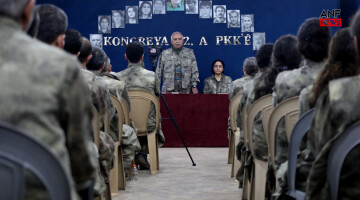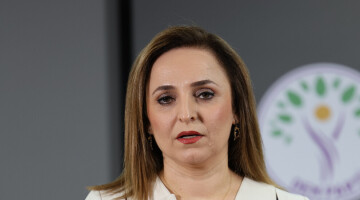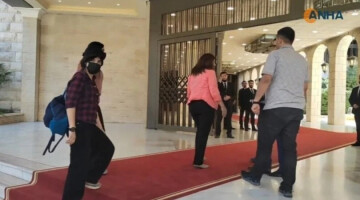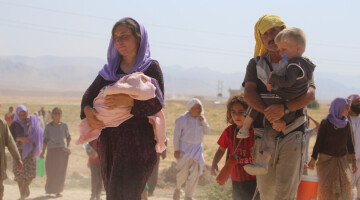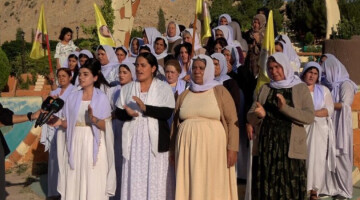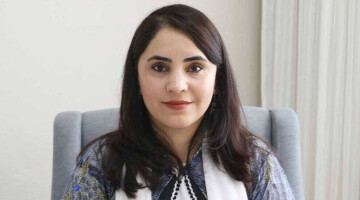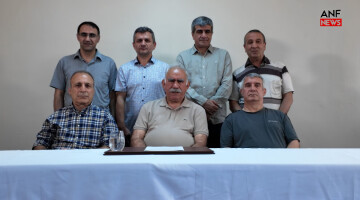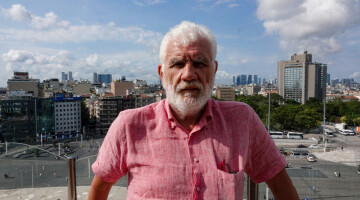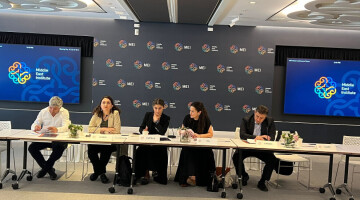The problem that we face today is not a new one. Its roots lie more than 6000 years ago with the roots of civilization itself. It was then that some ideas took hold which attacked society like a deadly virus and after a long struggle managed to infect the very core of human communities everywhere. These ideas are essentially opposed to the very nature of humankind and of life itself: that oppression and slavery are necessary, that they are right and that humans deserve them. The subjugation of nature paved the way for the subjugation of women, the subjugation of women in turn enabled the enslavement of men by other men. We have since lived under the yoke of these evils inflicted on us, being aware of their presence without ever truly understanding them. I will not elaborate this point, as one of the great things about Ocalan is that he has developed a more thourough analysis of these issues than I or any other human could hope to perform in our times (although I hope on this prognosis I will be proved mistaken). Much more urgent is to emphasize that he has published these analyses of the development of state and civilization and suggested solutions to our most pressing problems.
Countless wise, passionate and courageous persons have since taken on the fight against this system, ever changing its outer manifestation but leaving its core intact. Instead of overcoming it they gave the system powerful new weapons, their movements' strenghts were absorbed by the insatiable Leviathan. This has been the fate of all revolutionary struggles through history that were capable of challenging the global hegemony.
These movements have a common basis. They appear in next to all imaginable forms – as religions, struggles for autonomy and independence, philosophical schools, cultural movements, ideologies calling themselves socialism, communism or anarchism. As different as they may seem, they are fueled by the same universal desires for freedom, peace and siblinghood. However advanced and successful the system may be, nowhere has it been able to quench the longing for these goals that exist in every human society. It has however managed to channel the energies which arise from the stark contrast between these wishes and the societal reality for its own purposes. The people's struggles moved against singular governments or priviliged groups in the best and against social minorities and other kinds of arbitrary scapegoats in the worst case. The divide and rule credo has brought the oppressed to fight each other while the means of achieving unity remain in the hands of the oppressors, based more than anything on the hegemonial privilege of knowledge.
Most struggles fail because they lack an analytical basis, an understanding of the dynamics of society that is necessary to target the true origins of the crisis humankind has fallen into. This is what makes Ocalan one of the most outstanding revolutionaries of all time. He has managed to present a profound analysis of the crisis, developed an alternative to the current dilemma and brought in motion a movement that is willing to fight for this way out of the crisis, targeting its roots and not just symptoms of the problem. The establishment of the autonomy of Rojava as a confederation of stateless democratic communities can today be seen as the greatest success of more than forty years relentless revolutionary struggle.
The Rojava project is now at a crucial stage. If it stays isolated the military and economic necessities along with the ideological pressure of the hegemonial capitalist paradigma will force it to develop into some kind of liberal socialist state at best. To be successful the liberation of society needs to expand into the bordering parts of Kurdistan and, even more importantly, the societies of the wider Middle East. The model of autonomous communities administrating themselves and interacting in decentralized confederations can only thrive if it expands. The Rojava revolution promises the liberation of society, ecological development and the freedom of women as its basic mechanisms. It is vital for its success that all three points are wholeheartedly put into practice.
The current socio-political quarantine as well as the exhausting war are poisonous to the development of revolutionary ways of life in a society to which they are still very new. Nothing leads to dangerous compromises with the system like the pressure of war.
To avoid making unforgivable mistakes at this stage we need to learn from the examples of similar revolutionary projects in history. It surprises how staunchly similar the Spanish civil war situation 1936-1938 is to what is now happening in Mesopotamia. A communal, anti-state revolution brought in motion by a people's organization (PYD, CNT), the tensions between the central state and a people (Kurds, Catalans) within it striving for autonomy, a revolutionary fighting force (YPG, FAI) defending the country against a clerical-fascist counter-revolution (Daesh, Franco) in alliance with opportunist groups (Peshmerga, PSUC) who enjoy the support of the international powers (NATO, USSR)... Without doubt there are also mayor differences between both situations, most notably maybe between the Catalan anarchists and the Ocalan movement (the analytical comparison of these two revolutions is definitely material to fill more than one book), but the Catalan example is indispensable to understand about the great dangers we are in now.
The revolutionary transformation in Catalonia was compromised more and more under pressure from the communist and right-wing-socialists in the unity government. While the revolutionary anarchists were bound to the front by the fascist attacks, the opportunists step by step took over the control of the cities behind the frontlines, preparing to betray the revolutionaries. Citing the necessities of the war they drove the workers' councils out of the factories, reinstated repressive mechanisms and formed a mandatory 'People's Army' (corresponding to Rojavas Erka Parastina, service in which is mandatory for all able young men for six months) until finally they betrayed first the revolutionary socialists and then the anarchists, storming their centres in the cities and murdering thousands of them. The result was that the fascists overran what was left at the time of the Spanish republic.
We must never forget how easily everything we fight for can be lost if we are inattentive for one moment. It is so tempting to ease the long and difficult road to freedom by making concessions and arrangements with the system. Only must we realize that, if we take another way, this road will be lost. The war has caused us to pull all our energies and resources to the front, causing a dangerous stagnation in the revolutionary development in society. Achieving our goals requires a change of very deeply rooted ideas, a revolution of mindsets. It will take more than one generation. We must set it in motion now if our fight shall lead to more than a mention in textbooks fifty years from now.
Rojava has yet to prove that it can realize its vision of a republic without a state. It owes this effort not only to its own people, but to all those around the globe who today look to Mesopotamia with the hope that there is now an idea taking hold more powerful than all fascists of the world. This hope and this idea might be able to lead to something that is bigger than Kurdistan or the Middle East. It can lead to a new beginning in revolutionary undertakings around the globe.
It is wrong to merely criticise the establishment of the Erka Parastina without looking to the reasons of its formation. There is simply no alternative to resisting against Daesh at all costs – and YPG/YPJ alone can hardly muster the necessary numbers. Forced recruitment is never acceptable. But why did it become the only option? All internationalist revolutionaries have to give a hard self-critique about this. The defence of the Rojava revolution is our indiscussable responsibility. If we had filled up the ranks of our comrades in time they might never have had to resort to one of they most despiccable instruments of the state – forcing boys and young men to go to war.
It is not to late to take the right steps. Rojava has become a revolutionary center for people from all continents who have come to help. This gives us a great shot at the unity we so desperately need to win. At the moment our enemies know us better than we know each other. Rojava can be more than an example. It can be the common ground on which we come togheter to march as one against nation, state and oppression. And towards a new future.
*Salvador Zana is an internationalist revolutionary with roots in Europe and Africa. He is currently with YPG in Cizîre canton of Rojava.



